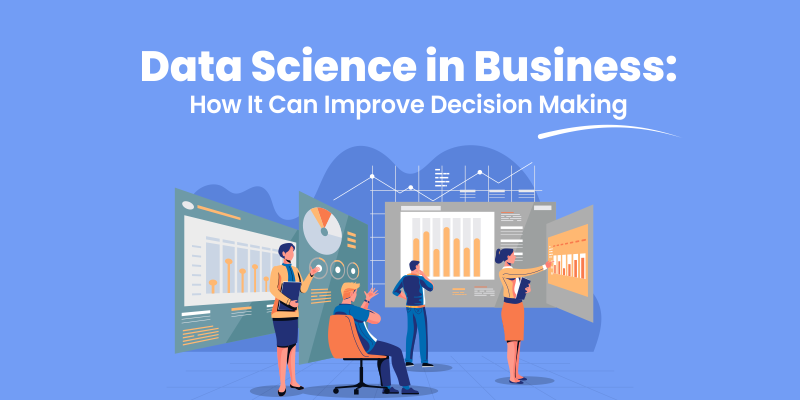“Data science is not just about collecting data, it’s about making better decisions.” – Katy Borner
This quote highlights the importance of data science in improving decision-making processes. Collecting and analyzing data is only useful if it leads to actionable insights that can inform decisions. Data science allows businesses to make informed decisions based on insights gleaned from large datasets, which can lead to improved operational efficiency, increased revenue, and better customer experiences. Ultimately, the goal of data science is to use data to make better decisions that drive business success.
If you want to master the field of data science, then you should enroll in Intellipaat’s Data Science Courses for clearing all your doubts.
Data science has evolved into an indispensable tool for organizations of all sizes seeking to make better-informed choices. The application of statistical and analytical tools to derive insights from massive datasets is what data science is all about. Data science insights may help firms optimize their operations, cut expenses, enhance revenue, and improve decision-making processes.
In this blog article, we will look at how data science may help businesses make better decisions and present some instances of how data science is being used in various sectors.
Identify Trends and Patterns
Data science can help businesses identify trends and patterns in their data that may be invisible to the human eye. By analyzing large amounts of data, data scientists can identify correlations and causal relationships that can help businesses make more informed decisions.
For example, a retailer can analyze their sales data to identify which products are selling well and which ones are not. They can also use data science to identify trends in consumer behavior, such as what times of day or days of the week people are most likely to make purchases. This information can help the retailer optimize their inventory management and marketing strategies.
Predictive Analytics
Predictive analytics is the use of data, statistical algorithms, and machine learning techniques to identify the likelihood of future outcomes based on historical data. By analyzing past data, businesses can make predictions about future events and make decisions accordingly.
For example, a financial institution can use predictive analytics to determine the likelihood of a customer defaulting on a loan. This information can help the institution make more informed decisions about lending and risk management.
Improved Customer Experience
Data science can help businesses improve their customer experience by providing insights into customer behavior and preferences. By analyzing customer data, businesses can identify patterns in customer behavior, such as what products or services they are interested in, and what factors influence their purchasing decisions.
For example, a hotel chain can analyze customer data to identify which amenities are most important to their guests. They can use this information to tailor their services and improve the overall customer experience.
Fraud Detection
Data science can also be used to detect fraud and other types of financial crimes. By analyzing financial transactions and other relevant data, data scientists can identify patterns that may indicate fraudulent activity.
For example, a credit card company can use data science to identify transactions that are outside of a customer’s normal spending habits. This information can help the company flag potential fraudulent activity and take appropriate action.
Inventory Management
Data science can help businesses optimize their inventory management processes by providing insights into inventory levels and demand patterns. By analyzing historical sales data and other relevant data, businesses can predict future demand and adjust their inventory levels accordingly.
For example, a grocery store can use data science to predict which products will sell out quickly and which ones will have slower demand. This information can help the store optimize their inventory levels and ensure they have enough stock on hand to meet customer demand.
Operational Efficiency
Data science can also help businesses improve their operational efficiency by identifying areas where they can make improvements. By analyzing operational data, businesses can identify inefficiencies and bottlenecks in their processes and take steps to optimize them.
For example, a manufacturing company can use data science to identify bottlenecks in their production process and make changes to improve efficiency. This information can help the company reduce costs, increase production capacity, and improve overall profitability.
Data Science in Business
Data science is the practice of extracting insights from large amounts of data using a combination of statistical methods, machine learning algorithms, and data visualization tools. The insights gained from data science can help businesses of all sizes optimize their operations, reduce costs, increase revenue, and improve their decision-making processes.
Here are some key areas where data science can be applied in business:
Predictive Analytics: Predictive analytics is the use of data, statistical algorithms, and machine learning techniques to identify the likelihood of future outcomes based on historical data. By analyzing past data, businesses can make predictions about future events and make decisions accordingly. For example, a marketing team can use predictive analytics to determine which marketing campaigns are likely to be most effective and target their resources accordingly.
Customer Segmentation: Customer segmentation involves dividing customers into groups based on their behavior, demographics, or other relevant factors. By segmenting customers, businesses can tailor their products, services, and marketing campaigns to better meet their needs. Data science can be used to analyze customer data to identify patterns and create targeted marketing campaigns for each customer segment.
Fraud Detection: Fraud detection involves the use of data science to identify fraudulent activities, such as credit card fraud or insurance fraud. By analyzing transactional data and other relevant data, businesses can identify patterns that may indicate fraudulent activity and take appropriate action.
Supply Chain Optimization: Data science can be used to optimize supply chain operations by identifying inefficiencies and bottlenecks in the supply chain. By analyzing data on inventory levels, delivery times, and other relevant factors, businesses can identify areas where they can improve efficiency and reduce costs.
Risk Management: Data science can be used to assess and mitigate risks in various areas of a business, such as financial risk, operational risk, and cybersecurity risk. By analyzing data and using predictive analytics, businesses can identify potential risks and take steps to mitigate them before they become a problem.
Human Resource Management: Data science can be used to improve human resource management by analyzing employee data, such as performance metrics, satisfaction surveys, and turnover rates. This information can be used to identify areas where improvements can be made and to develop strategies to retain high-performing employees.
Conclusion
To summarize, data science is a strong tool that may assist organizations of all sizes in making better decisions. Businesses may detect trends and patterns, forecast future events, optimize operations, cut costs, and improve customer experiences by analyzing enormous volumes of data. Data science will become an increasingly vital tool for organizations to stay competitive and prosper in the digital era as the amount of data available to them grows.





Be First to Comment